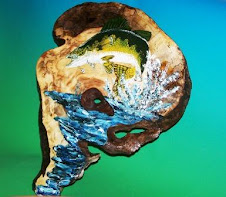Your Never Too Old to Start Fishing!
The Grandfather teaches the father, who teaches the son. Perhaps true at one time but times have changed; we have become an urban society. Our food comes from the grocery store shelf and our entertainment comes from TV, videos, and computers. Our fathers likely didn’t grow up on the land or simply may not have been interested in the outdoors. Then there are all of the new Canadians that have arrived over the past couple of decades, who may never have even dreamed of having leisure hours, let alone spending them by a quiet stream or drifting down a secluded lake.
Newcomers to fishing can be intimidated by their lack of knowledge and often don’t know where to start. Rods, reels, tackle, waders, boats; plugs, spinners, poppers, divers, rattlers; nymphs, muddlers, dry, wet…no wonder people are intimidated. But fear not; the art of angling is an evolution you don’t have to know everything to get started. Believe me when I tell you that hidden deep in the past of every pro angler there is a story of that bumbling, fumbling first cast. Fishing is about the experience, even more than about catching fish. It might sound cliché, but it is true.
So just how does someone get started? First of all there are the rules; some legal and other based on etiquette.
The very first thing to do if you are considering a venture into the world of recreational fishing is to pick up a copy of the annual fishing regulations available from most stores that sell fishing equipment or directly from the provincial ministry responsible for hunting and fishing (Ontario Ministry of Natural Resources http://www.mnr.gov.on.ca/en/Business/LetsFish/index.html - other provinces have similar links). Take some time to read it. Failure to understand the seasons and catch limits of various species can be a costly mistake. Next, buy your fishing license. These are usually available at local tackle shops, marinas, etc.
Now, assuming you’ve read the rules for your area, you are legal, but, there are also some unwritten laws; the ones that will get you into trouble with your fellow fishermen. Everyone is out for a good time and there is an air of respect and camaraderie amongst the fishing fraternity. Newcomers are quickly welcomed, but just as quickly shunned if basic rules of etiquette are not followed. There is one all encompassing rule from which everything else flows: “Show respect for others and for the environment”. There are few things more irritating than drift fishing a short run and having someone walk right in beside you and cast over your line. Or, to see someone toss trash into a lake or river with no thought of the consequences.
Now that you’re legal and know the basic rule of fishing etiquette, where to start?
Don’t worry about costly equipment, most of the waters flowing into the great lakes, the waters of reservoirs, streams, and even town ponds contain healthy fish populations. A hook, line, rod, reel and a can of worms is really all you need to get started.
Different types of fish prefer to live and eat under different conditions. That includes things such as water temperature, depth, and clarity as well as the type and amount of bottom structure available. There is a wealth of information, in all types of media, to assist the novice angler acquire basic knowledge about fish habitat and structure. Your chance of success is greatly enhanced if you take the time to learn the habits of the species you are seeking. http://canadianbiodiversity.mcgill.ca/english/species/fish/index.htm
Today most people own or have access to a computer. A couple of clicks will put you in touch with all the expert advice you will ever need. All you need to do is go to your favourite search engine, type in the word “fishing” followed by the location you want to fish (fishing+Toronto ON). You’ll be amazed at the amount of relevant information that unfolds before your eyes.
Another consideration is your proximity relative to the type of fish you have chosen to target. There is no point getting your heart set on fishing for grayling if you live in Southern Ontario, unless you can afford to spend a few thousand dollars to catch one. Consider the amount of free time you have, the amount of money you can afford to spend and then explore the type of fishing available in your area. I’ve spent some of my most memorable fishing hours sitting in a lawn chair beside a lazy river, fishing for the “lowly” carp with a big gob of worms on my hook.
Just remember that you’re never too old to begin the enjoyment of recreational fishing in Canada. It’s part of our heritage! Nearly every province in Canada offers a free fishing weekend and every angler started sometime, so don’t wait…just do it!
©Lloyd Fridenburg, 2008 – all rights reserved
This article is proudly brought to you by
.jpg)



.jpg)
No comments:
Post a Comment
Like it? Don't like it? Have another opinion? We value your comments.